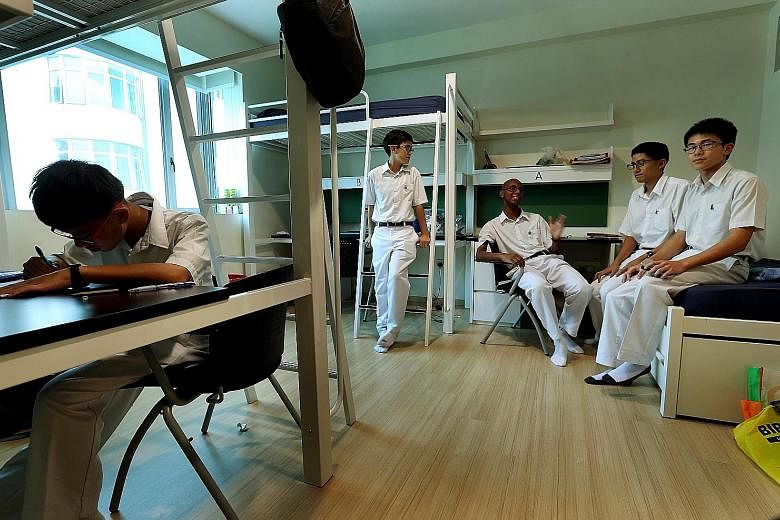How does one get ready for boarding school?
At Raffles Institution (RI), students take lessons on skills such as cooking, or how to get along with roommates, said Mr Low June Meng, head of leadership and character education at RI.
They learn these life skills during their 10-week boarding programme in their third year.
Year 3 student Ashvin Sivakumar, 15, who completed his boarding programme last month, said he learnt how to avoid conflict with roommates and how to resolve them at workshops.
"They will give us a few scenarios, and teach us how to tackle the problems. For example, if your roommate wants to do work till late at night and you're not comfortable with that, an option he can take is to do his work outside to avoid disturbing the others," he said.
The programme gives students a chance to make friends with those from other classes, said Mr Low. Students often live with people they do not know beforehand, as they are assigned roommates who are not from their classes.
Next term, the school will start its joint residential programme with other schools in the cluster. Muhammad Dhafer, 15, a Year 4 student, thinks this is a good idea. "You get exposure to different people, and they would have different experiences to share with you," he said.
The school also tries to achieve a balance between organised activities and free time for students.
"The little pockets of free time that this residential programme offers are very useful opportunities for them to get to know each other better," said Mr Low.
Students attend group discussion about once a week, in small groups of 10 or fewer. Topics can be about school or their boarding experience. Sometimes, the boys are encouraged to write a note or make a card for their parents.
"We encourage the boys to have a frank discussion," said Mr Low, adding that this helps them to go beyond classroom interactions to learn a lot more about their peers.
Ashvin, who shared a room with two other students, said that doing schoolwork was more efficient during his stay at the boarding school.
"You can get support from friends and ask them for homework help," he said. He also bonded with the students in his discussion group, with whom he worked to carry out community projects.
"We grew closer together, and recently went out to eat prata - it was our own little end-of-term celebration," said Ashvin.
Mr Low said he often gets feedback that the programme helps foster friendship and camaraderie.
"It's quite a different experience from going through a five-day camp, for example. You see each other every day, in school and after school, for an extended period of 10 weeks, so the bonding definitely takes place."
Yuen Sin


